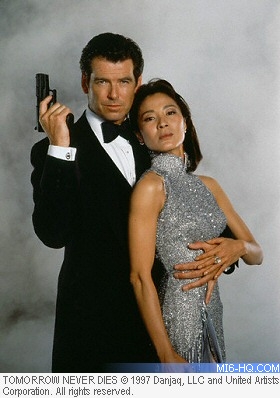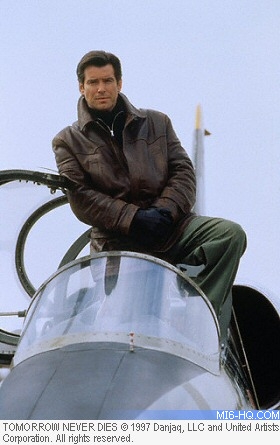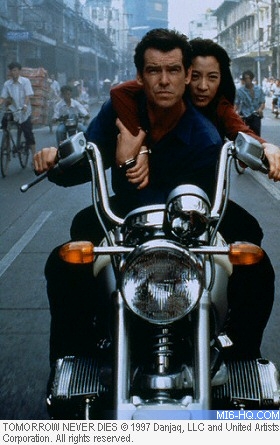 |
| |
MI6 trawls the archives to see how critics received
Pierce Brosnan's second 007
in "Tomorrow Never Dies"...
|
|
Time Tunnel: Review Rewind
11th December 2010
Variety - 14th December 1997
There is plenty of bang-bang but very little kiss-kiss in "Tomorrow
Never Dies," a solid but somewhat by-the-numbers entry in
the James Bond cycle. An imaginatively conceived media-magnate
villain and an unusually active female partner for the hero help
distinguish this 18th installment in the 35-year-old series, which
was thoroughly reinvigorated two years ago by "Goldeneye," a
series-best $350 million grosser worldwide. Latest effort, which
heavily favors straight-ahead action above all else, may not quite
match that exalted figure, but it will perform handsomely, with
Asian territories benefiting from the winning co-starring turn
by Malaysian-Hong Kong favorite Michelle
Yeoh.
After a six-year hiatus
in the longest-running franchise in film history, "Goldeneye" reaped
the rewards of a thorough series retrofitting, from a new
Bond in Pierce Brosnan to
a rejuvenation in most of the key artistic and crew positions.
For his part, Brosnan now looks so at ease in the role
that it seems like second nature to him, but elsewhere
the excitement and satisfaction is rather more intermittent,
with too much running time devoted to good guys and bad
guys spraying machine gun fire at one another.
Suggestively, pre-credit
action sequence doesn't measure up to the outrageous one
last time out, as Bond narrowly makes a getaway from a
terrorist arms bazaar by flying out in a commandeered Russian
plane. However, scenarist
Bruce Feirstein, who co-wrote "Goldeneye," has
done his best work here in cooking up a delicious and easy-to-hate
villain for the post-Cold War '90s, a megalomaniacal communications
tycoon, Elliot Carver (Jonathan
Pryce), whose network of satellites enables him to
reach nearly every corner of the globe and whose strategy
for domination involves manipulating world crises that
will be reported exclusively on his network. |
|

|
Carver's first major foray into the manufacture of international
conflict sees his high-tech stealth battleship sink a British
naval vessel in the South China Sea in a way that pins the blame
on the Chinese. With tensions rising between East and West, the
Brits send Bond to Hamburg to infiltrate a huge party Carver
is throwing, and it just so happens that Bond is an old playmate
of Carver's wife, Paris (Teri
Hatcher). Before embarrassing Carver by disrupting the bash,
Bond also makes the acquaintance of a striking Chinese woman,
Wai Lin (Yeoh), whose journalistic credentials are as transparent
as Bond's as a banker.
Realizing at once the threat Bond represents, both professionally
and personally, Carver dispatches his goon squad, led by blond
super-Aryan Stamper (Gotz
Otto), to erase him, but it is Paris
who pays the price for a brief old-times'-sake assignation. Vincent
Schiavelli amusingly makes the most of his one big scene as a
German torture specialist who just misses his chance to apply
his expertise to 007, and a car chase in a parking garage is
given an added dimension in that a besieged Bond is able to drive
his car by remote control, courtesy of one of Q's special new
gadgets.
Action then shifts to Southeast Asia, where, just by coincidence,
Bond runs into Wai Lin while both are scuba diving in the sunken
remains of the British naval ship. Quickly captured by Stamper,
Bond and Wai Lin, who --- surprise, surprise, is a Chinese agent
--- are put in intimate proximity "39 Steps"-style,
courtesy of handcuffs, and taken to Saigon, where they manage
to escape, making their way across roofs and narrow shantytown
streets by motorcycle in a nifty action set piece.
Proposing close collaboration in more ways than one, Bond is
rebuffed, but the two secret agents reunite in a climactic effort
to prevent World War III by locating Carver's stealth
ship, from
which a cruise missile is about to be launched toward Beijing,
and thwarting the billionaire's bid to establish his new world
order (which would include exclusive broadcast rights in the
elusive Chinese market for the next century).
Action finale recalls any number of earlier Bond pics in its
giant industrial hardware setting, innumerable explosions and
dozens of fatalities, and director Roger Spottiswoode brings
little that's new to the carnage in the way of special flair
or unusual nuances. Filmmakers have steered almost exclusively
toward action at the expense of sex, humor or the sort of jet-set
and gaming-room glamour often highlighted in the series. Aside
from the brief tryst with Paris, Bond's only other amorous adventure
is at the outset, with a blonde who is teaching him Danish in
the sack, prompting one of the film's few good one-liners from
Moneypenny, who remarks, "You always were a cunning linguist,
James."
Casting works well across the boards, with Pryce nimbly conveying
the media giant's cutthroat ambition, and the hunky superman
Otto embodying unalloyed menace as his No. 1 enforcer. Yeoh proves
a worthy equal partner to Bond, displaying snappy martial arts
moves and not for a moment falling into the compliant-bimbo mode
so common to the series.
The BMW was fun last time out, but the product placements are
becoming rather too numerous and prominent at this juncture.
Tech credits are consistent with the strong series standards.
The New York Times - 19th December
1997
No need to feel badly if the right watch, drink,
cell phone, etc., don't turn you into James Bond. They don't
really do it for Pierce Brosnan in ''Tomorrow Never Dies,'' either.
Despite Mr. Brosnan's best efforts to be lethally debonair, the
Bond franchise has sacrificed most of what made this character
unique in the first place, turning the world's suavest spy into
one more pitchman and fashion plate. This latest film is such
a generic action event that it could be any old summer blockbuster,
except that its hero is chronically overdressed.
This is not to say that ''Tomorrow Never Dies'' won't
be an international success like ''Goldeneye,'' which wasn't
much better. But it should fare best in corners of the
world where nobody knows how little the title means, or
how accurately it reflects the rest of the film's shallowness.
Closer than ever to cartoon superhero status, Bond is seen
battling ridiculous odds, dodging computer-generated explosions,
delivering lame bon mots and boasting pitifully about his
sexual prowess. All that gives this an up-to-date sensibility
is the audience's awareness that M (Judi
Dench) and Moneypenny (Samantha Bond) could sue him
for sexual harassment on the basis of his small talk.
This film does have a lively villain in Jonathan Pryce,
as a media mogul who dreams of everything from manufacturing
his own war to marketing software with bugs (so that customers
will have to upgrade for years). Mr. Pryce reigns mischievously
over an empire that Bond must infiltrate, and he also has
a wife (Teri Hatcher) who is one of Bond's approximately
one million ex-flames. Ms. Hatcher, like Mr. Brosnan, speaks
in a perfect monotone, and so does Michelle Yeoh, the Hong
Kong action star who is meant to kick some life into the
series. |
|

|
The film's other attempts to show Bond in a romantic light are
so hopeless that it's a lucky thing his partnership with Ms.
Yeoh's character, the svelte and athletic Wai Lin, stays confined
to toylike weaponry and flat double-entendres.
''And now a word from our sponsor,'' muttered the critic beside
me, as the camera offered a good look at James Bond's vodka bottle
midway through the so-called story. (The humor-free screenplay
is by Bruce Feirstein, author of ''Real Men Don't Eat Quiche''
as well as ''Goldeneye.'' The workmanlike director is Roger Spottiswoode.)
Indeed, despite Bond's mission to defeat the evil mogul, product
plugs are the film's most serious business, especially since
the audience may be bored enough to start looking at labels.
The film's two best supporting turns come from Vincent Schiavelli,
who has a cheerfully outrageous scene as a torture expert, and
from a nice, smart BMW that works on remote control. Hiding in
the back seat, Bond pilots the car through a tire-screeching
chase. Don't try this at home.
Chicago Sun-Times - 19th December 1997
James Bond has battled evil commies and megalomaniac madmen;
perhaps it was only a matter of time until he faced off against
a media baron -- the only sort of figure in today's world that
actually does seek global domination. His enemy in "Tomorrow
Never Dies'' wants to start a war in order to create headlines
for the launch of his latest news channel. Just imagine what
Rupert Murdoch and Ted Turner would like to do to each other
and imagine either one of them doing it to the Chinese, and you'll
get the idea.
Bond, played confidently and with a minimum of fuss by
Pierce Brosnan, stumbles into the middle of the plot, masterminded
by Elliot Carver (Jonathan Pryce), who owns newspapers,
TV stations and a gigantic Stealth warship that's invisible
to radar.
Carver's plan is ingenious: He'll use
his satellites to draw a British warship off course, sink
it with the
Stealth ship, steal its nuclear warheads, and fire one
at China, which will think it is under attack from the
West.
The only flaw in this plan, as far as
I can see, is the likely nuclear destruction of most of
Carver's
biggest markets.
Bond films traditionally open with an elaborate scene
built of stunts and special effects, and "Tomorrow
Never Dies'' doesn't break with custom: We see British
military officials monitoring a "Terrorist Arms Bazaar
on the Russian Border'' (which border? who cares?). A hothead
British general gives an order that leads to the likely
detonation of nuclear weapons. Then Bond appears, steals
the plane containing the warheads, uses its missiles to
destroy all of his enemies, and takes off in it before
... |
|

|
But I dare not reveal too much. The plot has a lot of fun with
the Carver character, played by Pryce in a platinum crew-cut.
He likes to write headlines and design front pages in advance
of big news events, and then make them happen, although more
than once he's premature in reporting the death of Bond. His
wife, Paris (Teri Hatcher), happens to be a former lover of 007,
and M (Judi Dench), head of British secret service, makes a few
tart suggestions about how Bond might make use of the connection.
The other Bond woman this time is a departure from many of 007's
former teammates. She's Wai Lin, an agent for the "Chinese
External Security Force,'' and she's played by Michelle Yeoh
as a karate expert with formidable fighting and intelligence
skills. Yeoh, of course, is a star in her own right, having toplined
many Asian martial arts movies, and her presence in the movie
is so effective that she'd be a natural to add to the other regulars,
like M, Q and Miss Moneypenny.
In its 35th year, the long-running Bond series has settled into
a dependable formula, based on gimmicks, high-tech toys, chases,
elaborate stunts, and the battle to foil the madman's evil schemes.
The toys this time are a couple of BMW products: A motorcycle,
used during an incredible chase scene over rooftops, and a car,
which is remote-controlled by a hand-held device with a touch
pad. In one ingenious chase scene, Bond crouches in the back
seat of the car while guiding it with the remote control.
All Bond movies include at least one Fruit Cart Scene, in which
market stalls are overturned in a chase, and this one sets some
kind of a record by having the carts destroyed by the blades
of a helicopter that's chasing Bond and Wai Lin. There is also
the obligatory Talking Killer scene, in which the madman explains
his plans when he should simply be killing Bond as quickly as
possible ('Caesar had his legions, Napoleon had his armies,
and I have my divisions--TV, newspapers ...').
Is Pierce Brosnan better or worse as Bond than Connery, Lazenby,
Moore and Dalton? This is one of those questions (like why doesn't
tomorrow ever die?) that can be debated but never answered. Basically,
you have Connery, and then you have all of the rest. I enjoyed
Brosnan in the role, although this time I noticed fewer Bondian
moments in which the trademarks of the series are relished.
Yes, we have the usual double entendres and product placements
(I find product placement distracting in most movies, but sort
of anticipate them as part of the Bond formula). There's a high
gloss and some nice payoffs, but not quite as much humor as usual;
Bond seems to be straying from his tongue-in-cheek origins into
the realm of conventional techno-thrillers.
Still, "Tomorrow Never Dies" gets the job done, sometimes
excitingly, often with style. The villain, slightly more contemporary
and plausible than usual, brings some subtler-than-usual satire
into the film, and I liked the chemistry between Bond and Wai
Lin (all the more convincing because the plot doesn't force it).
The look of the film is authoritative; the scenes involving warships
and airplanes seem sleek and plausible. There's gorgeous photography
as a junk sails in a sea filled with peaks, and astonishing action
choreography in the rooftop motorcycle chase.
On the basis of this installment, the longest-running movies
series seems fit for the 21st century.
Related Articles
 Tomorrow
Never Dies
Tomorrow
Never Dies